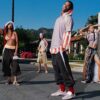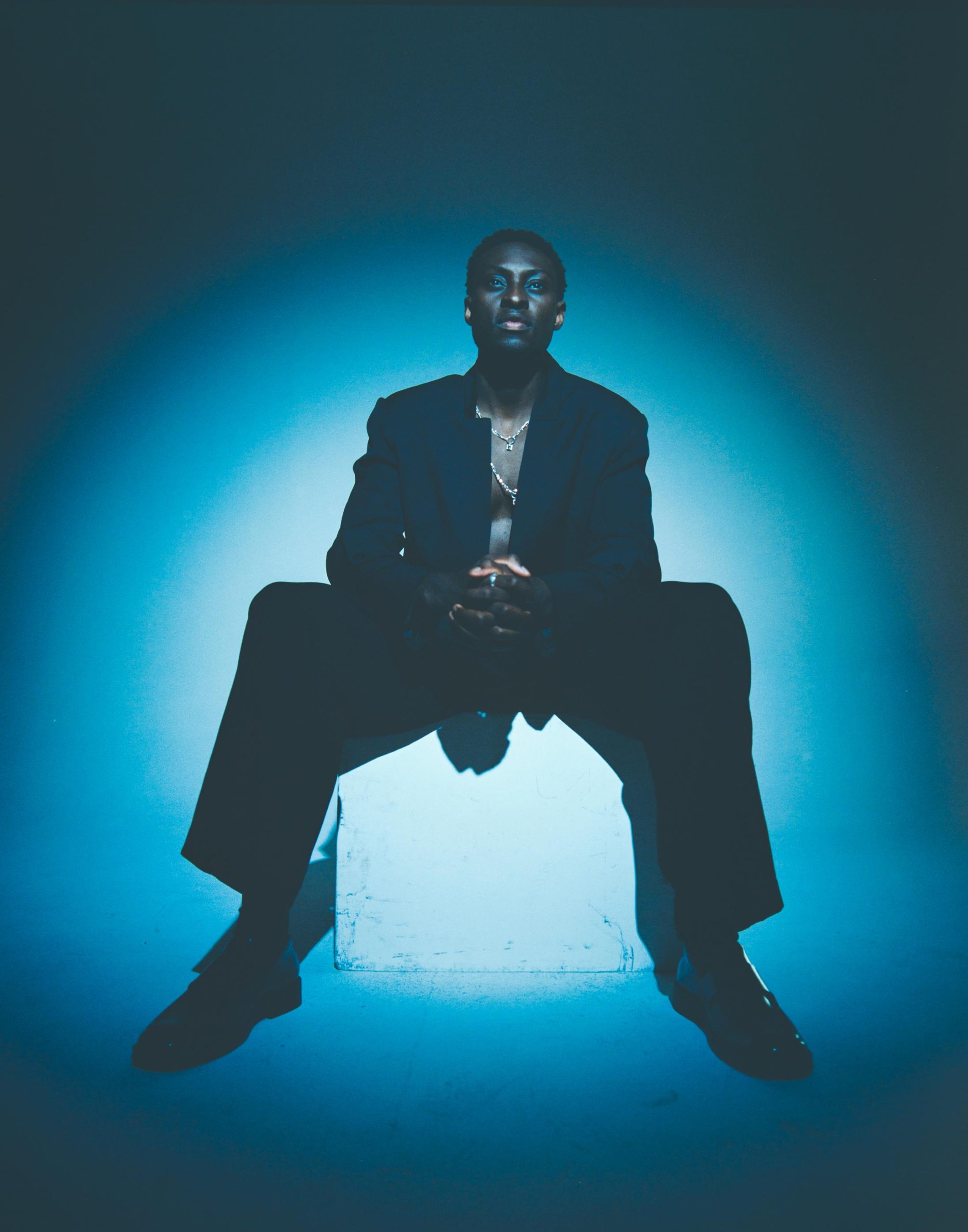
Rewrite
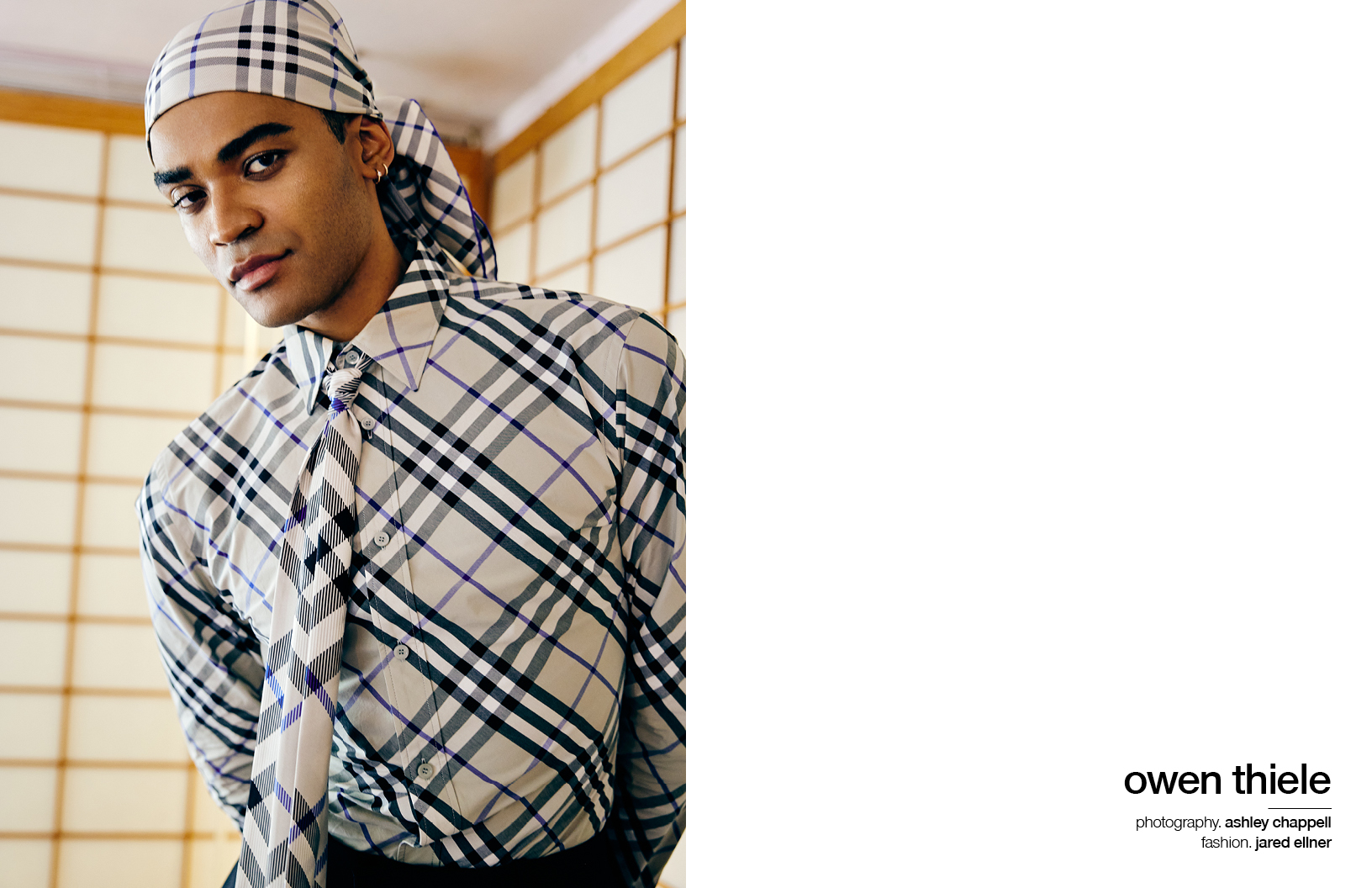
full look. Burberry
From lip-syncing to Britney Spears at age 2 and being a musical theatre kid, to scene-stealing actor navigating queer identity on screen with humour and heart, Owen Thiele’s path to roles like Overcompensating and Adults feels like a dream come true, but also inevitable. The Los Angeles native has been carving out a space for himself in Hollywood as one of Gen Z’s most exciting comedic voices, whether he’s podcasting from his bedroom with his friends or playing emotionally layered, larger-than-life characters like George in Benito Skinner’s new Amazon Prime Video series, Overcompensating, or Anton in FX’s Adults.
Known for his sharp wit and musical flair, Thiele first made a splash with viral sketches and scene-stealing roles in indie comedies like Theater Camp, quickly becoming a go-to presence for stories that blend chaos with heart. He is a trained singer and natural performer, bringing theatricality to every role, yet always with an undercurrent of sincerity that makes the punchlines land with greater impact.
Schön! chats with him about his latest projects, the importance of queerness on television, and his love of Taylor Swift.
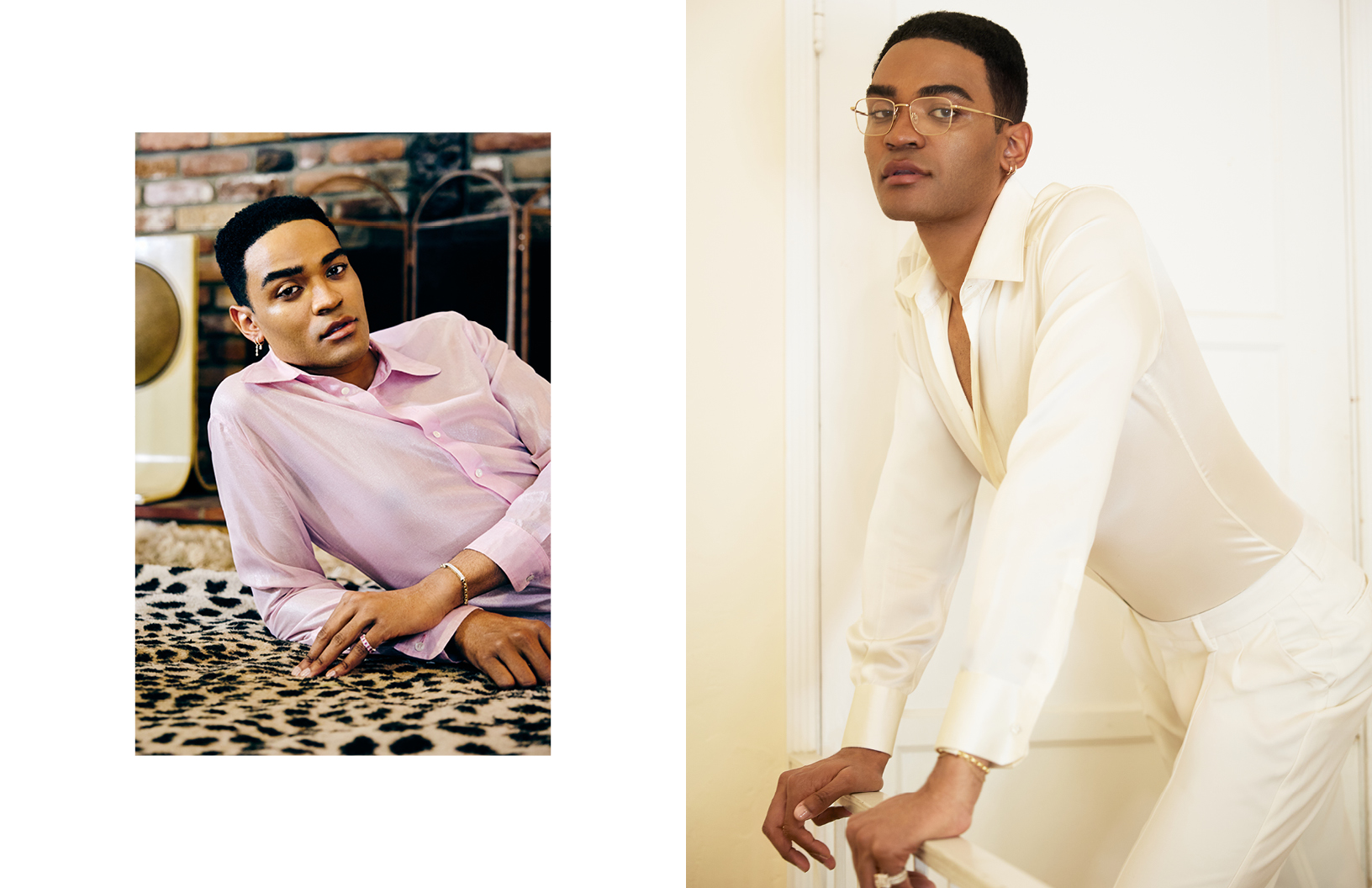
full look. Walter Van Beirendonck @ Courtesy of Wild West Social House
ring. Audrey Nicole Diamonds
opposite
make up. (skin)
Paula’s Choice Deutschland Pro-Collagen Peptide Plumping Moisturizer + Hyaluronic
Acid Booster, Rare Beauty Illuminating Primer, MAC Cosmetics Face and Body Radiant
Sheer Foundation, Danessa Myricks Yummy Skin Blush ‘Dancing Queen’, Charlotte
Tilbury Airbrush Flawless Finish Powder + Setting Spray, (eyes) Makeup by Mario
Master Mattes Eyeshadow palette + KESS Berlin Black Mascara, (lips) The Body Shop
Sheer Touch Lip & Cheek Tint in shade ‘Power’
dress. Stefan Uhr
shirt. Touché
Can you tell us about your character, George, in Overcompensating, and how he fits into the world of Yates University?
I think George is an unlikely student at Yates, but I think that’s what makes him so special and fun. He was so fun to play. He is like Benny’s gay fairy godmother, and I think I never had one growing up. I never really had a gay mentor, but watching the show, reading the scripts and talking to people afterwards, it seems really important that someone like Benny had one, you know? And I think that Benny writing that into the script was cathartic for him, and it was beautiful to play for me, because, like I said, I never really had one. So playing one was very cool.
The show digs into identity, performance, and masculinity in college culture. Did any of those themes hit close to home for you or challenge you as a performer?
That’s a really beautiful question. You know, I was very lucky growing up that my parents were so supportive of me and I could be very open with them, so I actually didn’t struggle with my identity as much as Benny did in his show or in real life. I know that it’s very rare, but I came out at a young age, and I was always performing, and I always had a dream to be on stage.
At the youngest age I can remember, I think I was two years old, I was like, singing “I’m A Slave 4 U” by Britney Spears with a fake snake. I never really had an issue with identity in terms of performance. Of course, being gay, growing up anywhere, masculinity is always something that comes into play. How feminine are you? How masculine are you? I think it’s toxic, and I learned that at a young age as well, because my mom was like you can be whatever you want, so I never really struggled with it. But I know that I’m one of the rare ones, and I’m very privileged for that.
There were tons of cameos and characters on the show from Megan Fox, Charli XCX, and TikTok creators. What was the energy like on set?
Well, it was so sad. I actually didn’t work with any of the amazing guest stars, so it was kind of a surprise for me. I mean, I read the script, but it was also just amazing to see Charli XCX. I screamed. I was like, “That’s so cool.” First of all, she’s a fantastic actress. She’s so funny. But it was mostly me and Benny in my scenes.
I got to know Holmes because she was on set during times I was there, but we didn’t really have any scenes together, either. So it was kind of just me and Benny, which is so special and amazing, because Benny’s been one of my best friends for three years now. It was just like two friends hanging out. It felt like we were making a sketch or something. The vibe on set was so warm and beautiful, and like I said, I wasn’t with the guest stars, but I heard they were just magical. I got to meet Kyle MacLachlan and Connie Britton in a panel recently, and I want them to be my parents. They’re so cool!
I didn’t know you and Benny were friends before this. That must have been so special then to work together.
It was funny because at first we were not playing friends, and then Benny hurt me as a friend in the show. So then I’m kind of grappling with that, and it was fun to feel so close to him in real life, and then get to play angry at each other. That made the experience easier.
That scene in particular was a hard watch. Your face completely fell when he hurt you.
I’m so proud of Benny for writing that scene, because I think the one thing I did experience in high school was that, actually. It was not that I was dealing with identity, or even coming out, because I was so lucky that I had a family that accepted me. But friends were tough. And I think that’s what I related to so much about the script is having somebody who is your friend secretly, but then publicly saying we don’t speak, because it would make them seem weak or gay, or, you know, whatever Benny was feeling in that moment. That scene was so poignant for me.
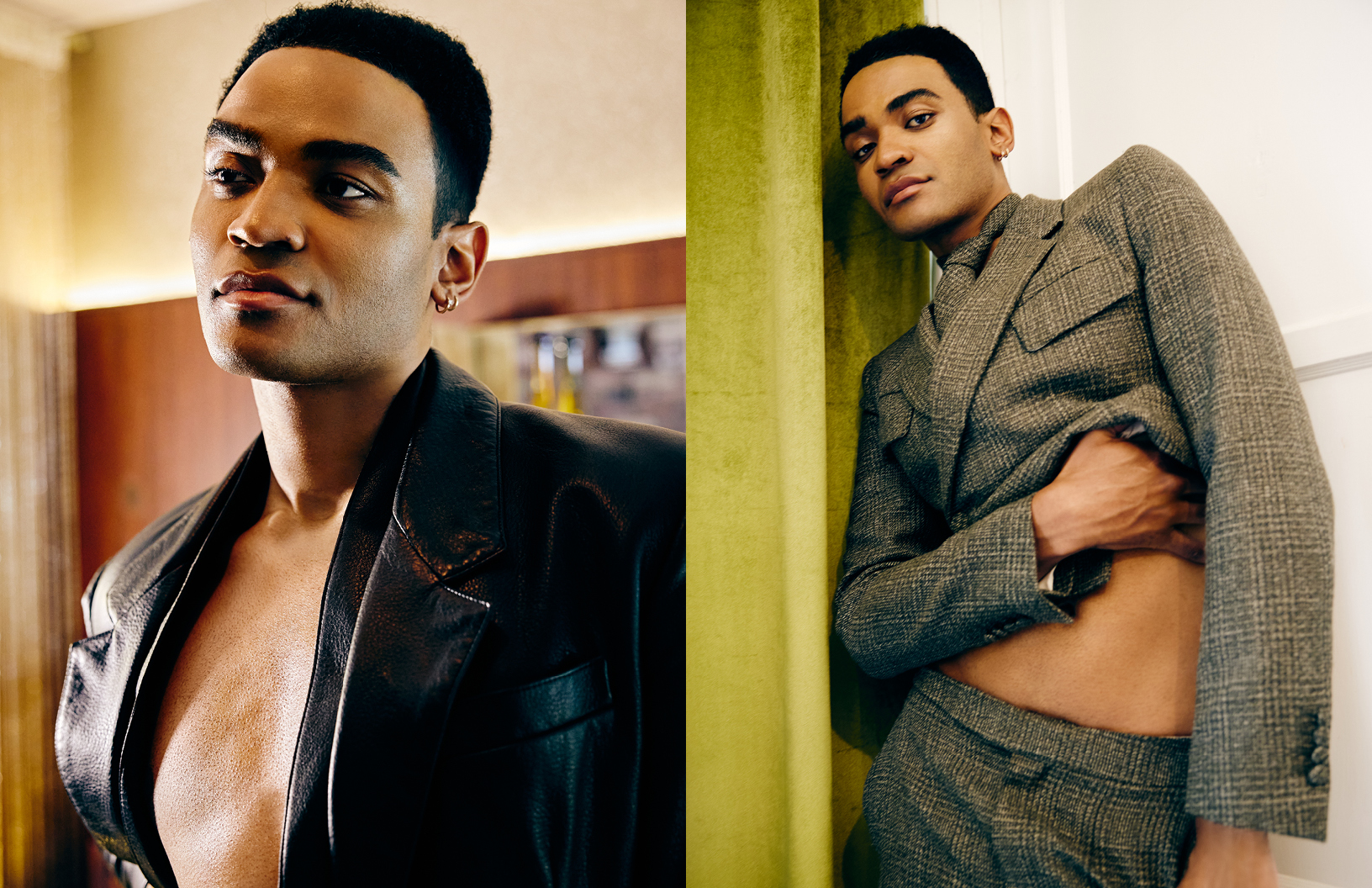
full look. Ferragamo
opposite
full look. Dolce & Gabbana
Was there a moment or storyline in the season that you’re especially proud of, or were really excited for people to see?
I went home the day I shot this particular scene with Benny, where we both look at each other, and I’m essentially saying that he’s gay, and he’s saying he’s not, and I’m saying, like, “No, it’s okay to be gay. I see that you’re gay. I know you’re gay, just through your eyes.” There was no voice, and I think there was no talking, and I think that that was so fun to shoot, because Benny and I were just staring at each other’s eyes for four hours. I gave every look I could possibly think to give, and I went home, and I called my boyfriend, and I was like, either that scene will work beautifully, or my eyes didn’t say anything. Seeing it back, I was like, whoa, it worked. It’s great. It’s fun. So yeah, I’m proud of that scene.
This speaks to your friendship with Benny and that you’re able to connect with him so deeply that you can communicate by just looking at each other.
Yes, exactly. It’s just hard to do that on screen. Because you can’t see yourself, obviously. So I was like, am I just blinking uncomfortably? Does it just look like I have something, a bug flew into my eye? Or does it track?
If George from Overcompensating could crash any other project you’ve worked on, where do you think they’d have the most fun?
George would die, die, die for Theater Camp. He would love to be there. I think he and the character I played in Theater Camp would just be fast friends. They would hang out all the time. I think George would actually crash the kids’ performance and somehow make it about himself, but in a fun way.
How did working on Adults compare to some of your recent projects? Did it challenge a different side of you, comedically or creatively?
Adults gave me the first character I really got to sink my teeth into. I feel like with George and Overcompensating, it was a pivotal role for Benny, so I’m very lucky to have played that as well. But I think with Adults, I’m in it more, so I’ve got more to think about in terms of my character arc. It was challenging, but amazing, and I love the cast and the crew and the creators so deeply. They are family to me at this point. It felt like working with friends again.
I feel like I’ve been so lucky in the few things that I’ve done, because one of them is Theater Camp with my best friend, Molly Gordon. Then I did Overcompensating with my best friend Benito Skinner. Now I’m doing Adults with my new best friends. I got very lucky in that, and I’m spoiled, because now I just want to work with my friends, which I know is not gonna happen, but hopefully I just keep making more along the way.
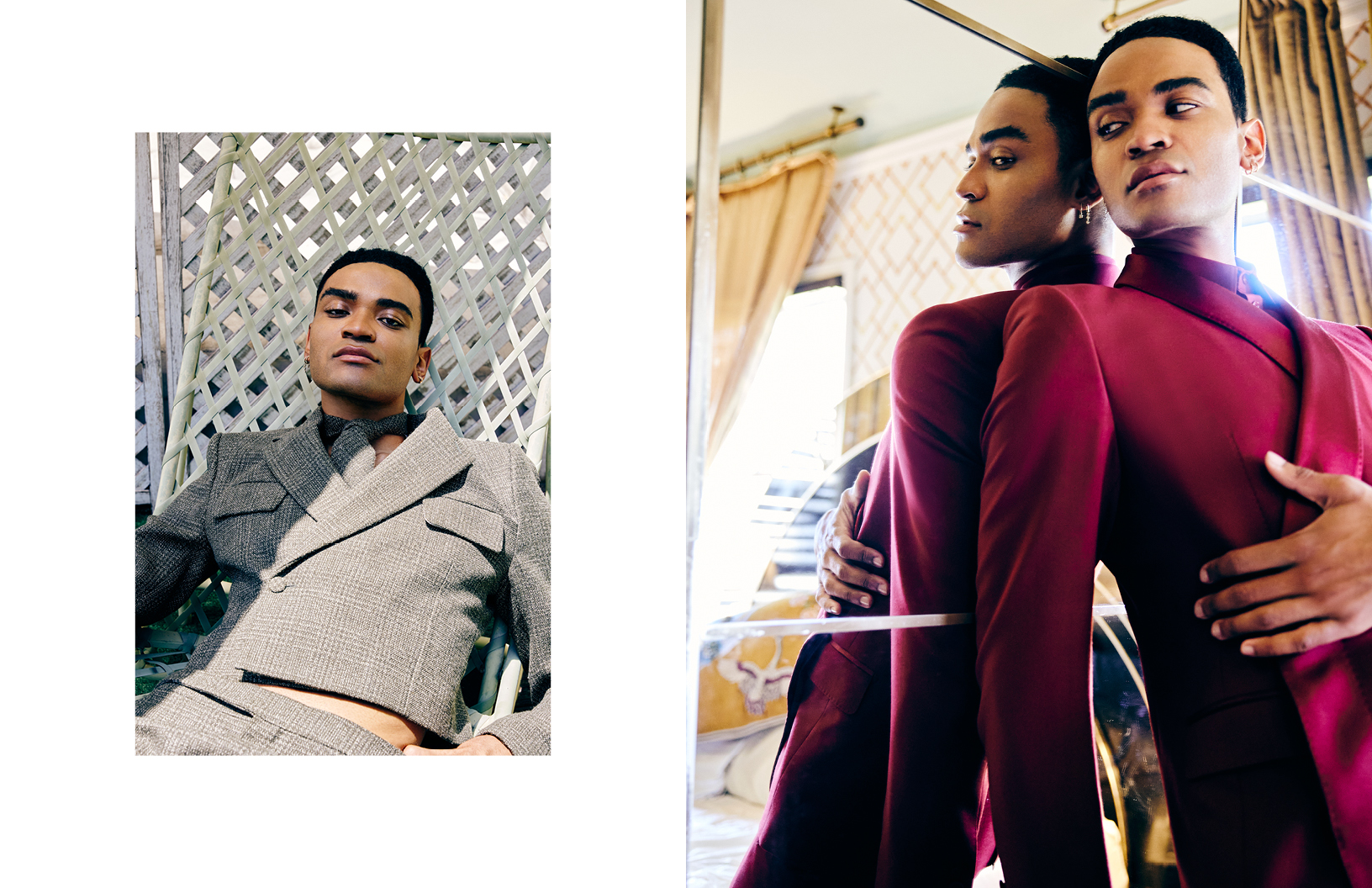
full look. Dolce & Gabbana
opposite
full look. Dolce & Gabbana
What was your first reaction when you read the script for the show, and how did you imagine yourself fitting into that world?
Oh, my God. I laughed so hard. I laughed like five times per page, and I don’t usually laugh when I read. First of all, I think I’m dyslexic. I’m realizing that because it’s getting harder and harder for me to read. So, reading the script for Adults and laughing five times per page, I was like, “I get this. I love this. I need this.” And I related so deeply to Anton. I think the two shows I’m in do very important things.
I think Overcompensating, it’s important to show a coming out story, especially one like Benny’s, and do it in a humorous way that makes people feel seen and comfortable. And then, on the flip side, I think it’s really important in Adults to have a gay character that isn’t necessarily dealing with that, that is just kind of living. So I’m very lucky that I got to play those two things.
The show’s original title, Snowflakes, hints at some generational critique. Did you see your character as part of that satire or someone who’s totally oblivious to it?
That is such a good question. No, I think Anton is in on the joke. I think Anton knows where he stands in culture. I think he can make his friends laugh. So I think he would like to make the audience laugh. I think he knows he’s a character that plays into the Gen Z of it all. But I think some characters in the show would be oblivious to it, and that’s their genius. You know, I think Issa is probably oblivious to it, but that’s her specialty.
You have a gift for playing bold, high-energy characters while still giving them real depth. How do you strike that balance between big personality and emotional truth?
First of all, thank you. That’s so nice. I’m a very high-energy person, so I bring that to the role, which is why I’ve only been able to play versions of myself. Maybe at some point I’ll be able to actually act, but for right now, I can only kind of play versions of myself. I bring my lack of sleep, energy, and my kind of manic energy to the characters.
I do think it’s important to ground a character. I think it’s easy to go into caricature, especially when you’re playing a fun, loud character like Anton, but hopefully I grounded it and made it feel real enough. I think the easiest thing on set is to just listen to your scene partners and really hear what they’re saying and then react off a bit. So that’s how I do it. But thank you for saying that. It’s so nice!
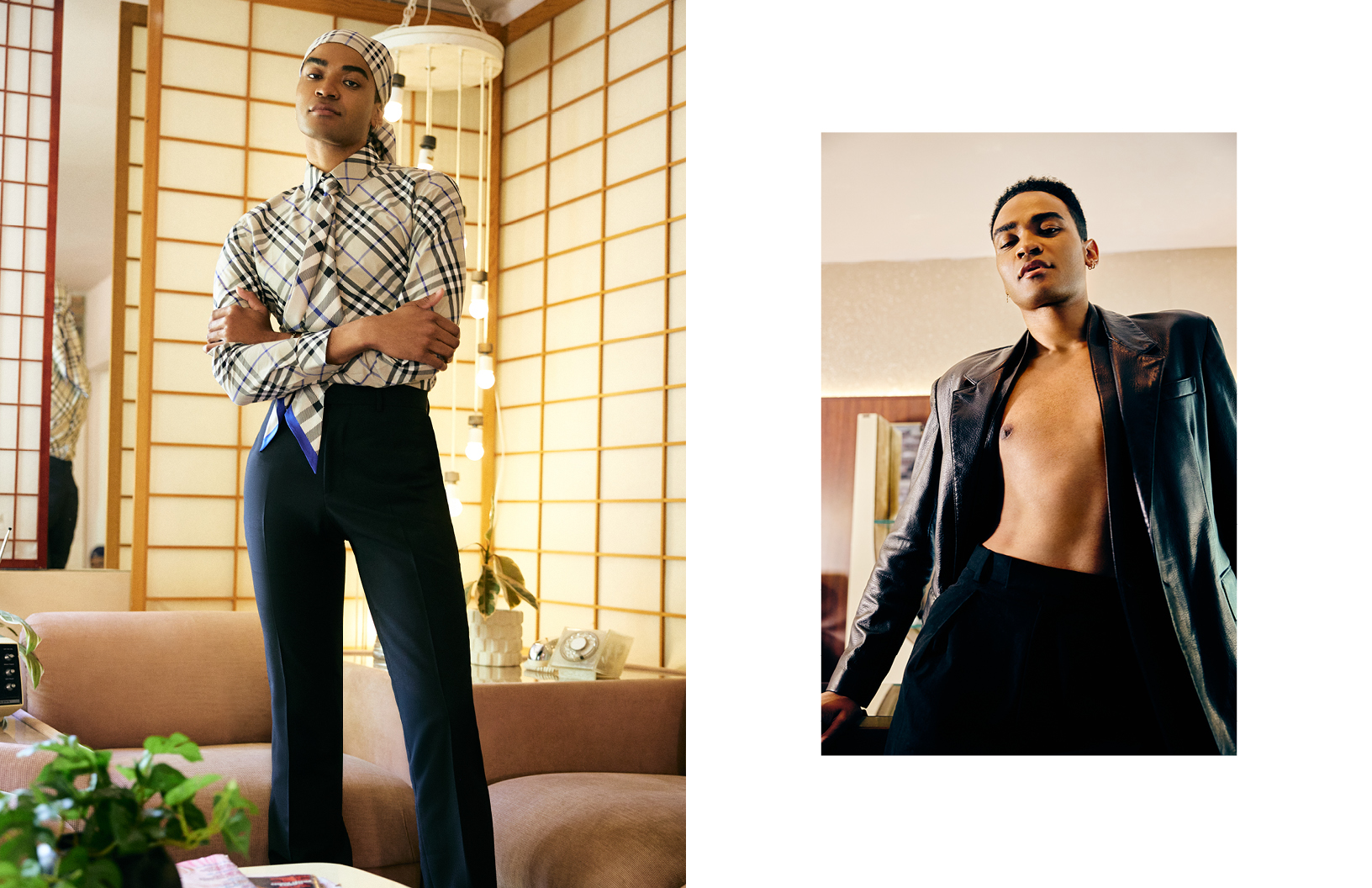
full look. Burberry
opposite
full look. Ferragamo
A few actors have spoken up about essentially playing the same kind of roles and getting typecast in that way. But if it’s a role that is very much you, then that might be easier.
That’s true. I think when I read Anton, I knew Anton, so yeah, it was pretty easy to tap into. But Anton had some emotional beats this season that were actually tougher for me, that actually felt like real acting. There’s one moment when Anton’s friends are pushing him to go break his dry spell, and he feels ready to do it. He leaves the house, he gets dressed, he’s excited, and then he has a moment where he’s like, I can’t do this. And he turns back, and he crawls through the window upstairs and lies to his friends about going. And I think that to me, I probably am such a people pleaser in real life that I would just go. But I think Anton really struggles emotionally and is a little more guarded than I am, so that was harder to tap into for me.
From Theater Camp to Overcompensating, you’re building a body of work full of humour and heart. What draws you to these projects, and do you feel like your comedic voice is evolving?
Such a beautiful question. I think I’m driven to very funny scripts, but also scripts that will make you cry. I think the most powerful thing is watching a comedy that just makes you sob, like The Office. You’re watching The Office and you’re crying at moments with Michael Scott because you feel bad for him, but you also love him. There are real emotions, and they feel like real people, even if they’re, you know, zany and kooky. So I think what’s drawing me to these scripts and the work that I’ve been doing. They are really well written and ultimately emotional. And I think that I’m very lucky to have been in the things that I’ve been in, because I feel like they all have that.
How much improv made it into your scenes on Overcompensating and Adults? Or do you usually stick to the scripts?
For both projects, the creators were so gracious, and they were like, “Do whatever you want.” But of course, their words were so good that I couldn’t possibly just do what I wanted. It would never live up to what they have written. So I would always do as written for the first few scenes, for the first few runs, and then for the next few takes, I would loosen up and kind of find George or Anton within me and just see what I would say as them.
Some of the improv made it in, but I also think that I’m truly a believer that you can only improv if the script and the characters are well developed enough. And so I think with both creators, they really developed these characters enough for the actors to just be able to then improv off of them. So honestly, kudos to them.
These shows are exploring queerness in a way that feels refreshing, not trauma-centred, but still deeply honest. What did it mean to be part of these narratives?
It’s huge. I’m very lucky. I think that they’re doing two different things in terms of queerness, but I think they’re both equally important. Very lucky to be playing two queer characters that are both serving different roles in the shows. I search for queerness in every project, and I hope we continue to have queer characters. I think it’s really important, and that’s not just for me to get cast in things. I truly, truly hope that we keep having queer stories. I think my friends who aren’t queer, who watched both Overcompensating and Adults, felt comforted with both Benny’s story and with Anton’s story. I think that it’s important.
How does that past version of you feel about the work you’re doing now?
If I went back and told my 12-year-old self that I was going to be in two television shows this year, acting along with dear friends of mine.. I think they would call me a liar. I really can’t believe it. It’s crazy. It’s amazing. And it’s been my dream forever. I wanted to be in musical theatre. I wanted to be in front of the camera. I wanted to be anything. I wanted to just perform, and so I’m very lucky that I get to do it.
You’ve explored podcasting, music, and acting. Do you approach each medium differently, or do they all feel like part of the same creative expression for you?
You know what? They all feel pretty similar to me. It just feels like creating. It feels like throwing things against the wall and seeing if they stick. But I think the most important thing about creating is liking it yourself. So everything I do, I have to like it myself. And so, reading the Adults and Overcompensating scripts before I did it, I was like, “oh my God, I would watch this. I am obsessed with this. I like this myself. I would be honoured to be in it.” And same with podcasting. Podcasts can be really boring, so if I’m making myself laugh, hopefully I’m making one other person laugh, and if I’m not, at least I’m making myself laugh, you know?
Your In Your Dreams podcast features some iconic guests. Who’s your dream guest you haven’t booked yet, and what would you want to ask them?
What’s funny is every time I book someone, I think they’re my dream guests, and then I’m like, now I have my dream guest on, so who’s next? My dream guest would be the classic Taylor Swift. She doesn’t do podcasts, so it would be an honour to get her, but also, I’m such a Swiftie, so it would be a lot of fun to dive into her body of work. That would be so much fun to have her in my tiny little bed with her on the wall behind us. It would be iconic. She’s my dream guest. But like I said, it’s really funny. I was like, Emma Chamberlain would be my dream guest, and then she was my first guest. Then I said Rachel Sennott was my dream guest, and she was my second guest. It’s amazing, it’s beautiful, and they’re friends of mine, but there are no favours. They didn’t have to say yes, but it’s very nice that they did.
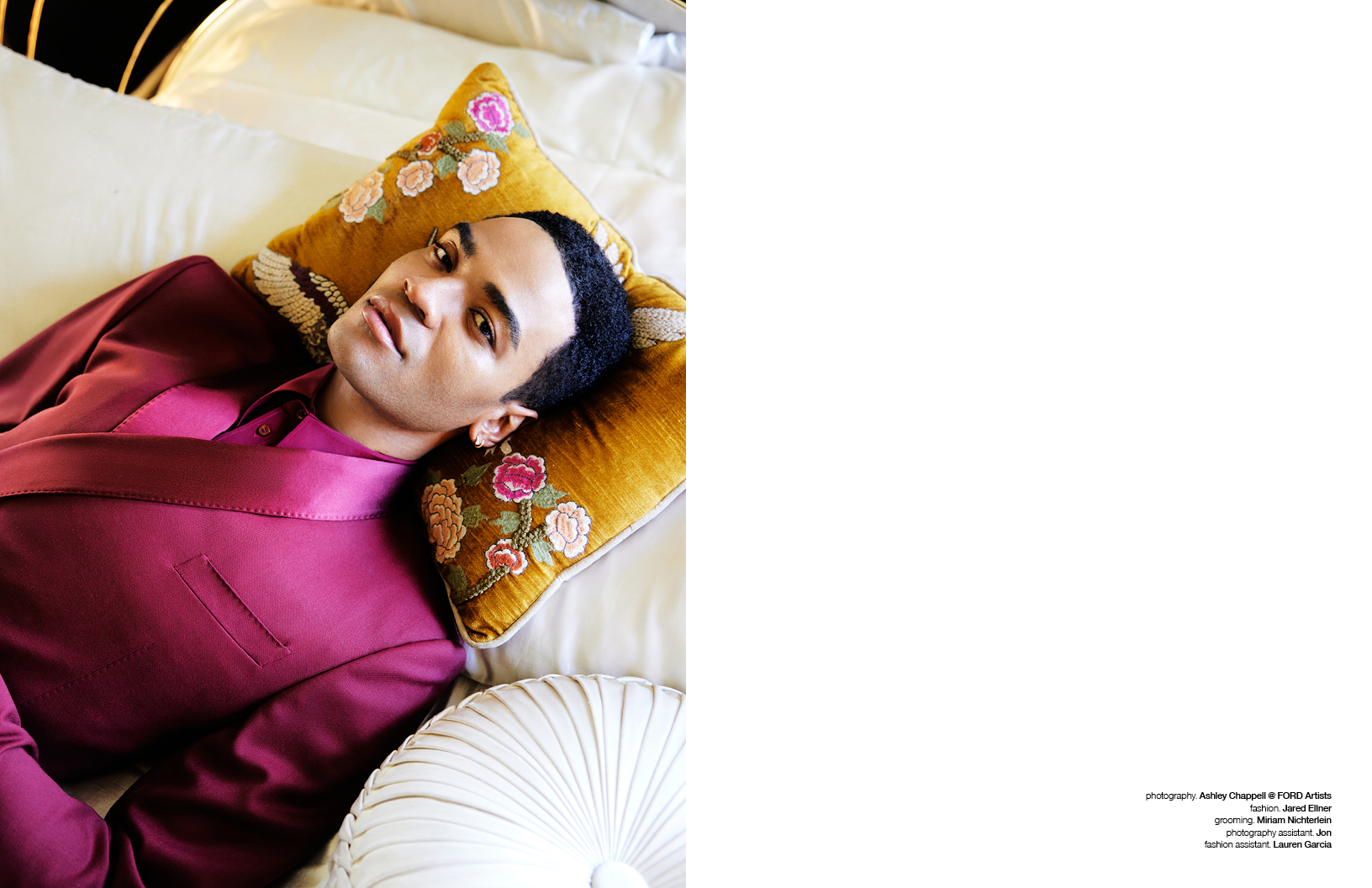
full look. Dolce & Gabbana
Overcompensating and Adults are both streaming now.
photography. Ashley Chappell @ FORD Artists
fashion. Jared Ellner
grooming. Miriam Nichterlein
production. Kelsey Barnes
photography assistant. Jon
fashion assistant. Lauren Garcia
interview. Naureen Nashid
in HTML format, including tags, to make it appealing and easy to read for Japanese-speaking readers aged 20 to 40 interested in fashion. Organize the content with appropriate headings and subheadings (h1, h2, h3, h4, h5, h6), translating all text, including headings, into Japanese. Retain any existing
tags from

full look. Burberry
From lip-syncing to Britney Spears at age 2 and being a musical theatre kid, to scene-stealing actor navigating queer identity on screen with humour and heart, Owen Thiele’s path to roles like Overcompensating and Adults feels like a dream come true, but also inevitable. The Los Angeles native has been carving out a space for himself in Hollywood as one of Gen Z’s most exciting comedic voices, whether he’s podcasting from his bedroom with his friends or playing emotionally layered, larger-than-life characters like George in Benito Skinner’s new Amazon Prime Video series, Overcompensating, or Anton in FX’s Adults.
Known for his sharp wit and musical flair, Thiele first made a splash with viral sketches and scene-stealing roles in indie comedies like Theater Camp, quickly becoming a go-to presence for stories that blend chaos with heart. He is a trained singer and natural performer, bringing theatricality to every role, yet always with an undercurrent of sincerity that makes the punchlines land with greater impact.
Schön! chats with him about his latest projects, the importance of queerness on television, and his love of Taylor Swift.

full look. Walter Van Beirendonck @ Courtesy of Wild West Social House
ring. Audrey Nicole Diamonds
opposite
make up. (skin)
Paula’s Choice Deutschland Pro-Collagen Peptide Plumping Moisturizer + Hyaluronic
Acid Booster, Rare Beauty Illuminating Primer, MAC Cosmetics Face and Body Radiant
Sheer Foundation, Danessa Myricks Yummy Skin Blush ‘Dancing Queen’, Charlotte
Tilbury Airbrush Flawless Finish Powder + Setting Spray, (eyes) Makeup by Mario
Master Mattes Eyeshadow palette + KESS Berlin Black Mascara, (lips) The Body Shop
Sheer Touch Lip & Cheek Tint in shade ‘Power’
dress. Stefan Uhr
shirt. Touché
Can you tell us about your character, George, in Overcompensating, and how he fits into the world of Yates University?
I think George is an unlikely student at Yates, but I think that’s what makes him so special and fun. He was so fun to play. He is like Benny’s gay fairy godmother, and I think I never had one growing up. I never really had a gay mentor, but watching the show, reading the scripts and talking to people afterwards, it seems really important that someone like Benny had one, you know? And I think that Benny writing that into the script was cathartic for him, and it was beautiful to play for me, because, like I said, I never really had one. So playing one was very cool.
The show digs into identity, performance, and masculinity in college culture. Did any of those themes hit close to home for you or challenge you as a performer?
That’s a really beautiful question. You know, I was very lucky growing up that my parents were so supportive of me and I could be very open with them, so I actually didn’t struggle with my identity as much as Benny did in his show or in real life. I know that it’s very rare, but I came out at a young age, and I was always performing, and I always had a dream to be on stage.
At the youngest age I can remember, I think I was two years old, I was like, singing “I’m A Slave 4 U” by Britney Spears with a fake snake. I never really had an issue with identity in terms of performance. Of course, being gay, growing up anywhere, masculinity is always something that comes into play. How feminine are you? How masculine are you? I think it’s toxic, and I learned that at a young age as well, because my mom was like you can be whatever you want, so I never really struggled with it. But I know that I’m one of the rare ones, and I’m very privileged for that.
There were tons of cameos and characters on the show from Megan Fox, Charli XCX, and TikTok creators. What was the energy like on set?
Well, it was so sad. I actually didn’t work with any of the amazing guest stars, so it was kind of a surprise for me. I mean, I read the script, but it was also just amazing to see Charli XCX. I screamed. I was like, “That’s so cool.” First of all, she’s a fantastic actress. She’s so funny. But it was mostly me and Benny in my scenes.
I got to know Holmes because she was on set during times I was there, but we didn’t really have any scenes together, either. So it was kind of just me and Benny, which is so special and amazing, because Benny’s been one of my best friends for three years now. It was just like two friends hanging out. It felt like we were making a sketch or something. The vibe on set was so warm and beautiful, and like I said, I wasn’t with the guest stars, but I heard they were just magical. I got to meet Kyle MacLachlan and Connie Britton in a panel recently, and I want them to be my parents. They’re so cool!
I didn’t know you and Benny were friends before this. That must have been so special then to work together.
It was funny because at first we were not playing friends, and then Benny hurt me as a friend in the show. So then I’m kind of grappling with that, and it was fun to feel so close to him in real life, and then get to play angry at each other. That made the experience easier.
That scene in particular was a hard watch. Your face completely fell when he hurt you.
I’m so proud of Benny for writing that scene, because I think the one thing I did experience in high school was that, actually. It was not that I was dealing with identity, or even coming out, because I was so lucky that I had a family that accepted me. But friends were tough. And I think that’s what I related to so much about the script is having somebody who is your friend secretly, but then publicly saying we don’t speak, because it would make them seem weak or gay, or, you know, whatever Benny was feeling in that moment. That scene was so poignant for me.

full look. Ferragamo
opposite
full look. Dolce & Gabbana
Was there a moment or storyline in the season that you’re especially proud of, or were really excited for people to see?
I went home the day I shot this particular scene with Benny, where we both look at each other, and I’m essentially saying that he’s gay, and he’s saying he’s not, and I’m saying, like, “No, it’s okay to be gay. I see that you’re gay. I know you’re gay, just through your eyes.” There was no voice, and I think there was no talking, and I think that that was so fun to shoot, because Benny and I were just staring at each other’s eyes for four hours. I gave every look I could possibly think to give, and I went home, and I called my boyfriend, and I was like, either that scene will work beautifully, or my eyes didn’t say anything. Seeing it back, I was like, whoa, it worked. It’s great. It’s fun. So yeah, I’m proud of that scene.
This speaks to your friendship with Benny and that you’re able to connect with him so deeply that you can communicate by just looking at each other.
Yes, exactly. It’s just hard to do that on screen. Because you can’t see yourself, obviously. So I was like, am I just blinking uncomfortably? Does it just look like I have something, a bug flew into my eye? Or does it track?
If George from Overcompensating could crash any other project you’ve worked on, where do you think they’d have the most fun?
George would die, die, die for Theater Camp. He would love to be there. I think he and the character I played in Theater Camp would just be fast friends. They would hang out all the time. I think George would actually crash the kids’ performance and somehow make it about himself, but in a fun way.
How did working on Adults compare to some of your recent projects? Did it challenge a different side of you, comedically or creatively?
Adults gave me the first character I really got to sink my teeth into. I feel like with George and Overcompensating, it was a pivotal role for Benny, so I’m very lucky to have played that as well. But I think with Adults, I’m in it more, so I’ve got more to think about in terms of my character arc. It was challenging, but amazing, and I love the cast and the crew and the creators so deeply. They are family to me at this point. It felt like working with friends again.
I feel like I’ve been so lucky in the few things that I’ve done, because one of them is Theater Camp with my best friend, Molly Gordon. Then I did Overcompensating with my best friend Benito Skinner. Now I’m doing Adults with my new best friends. I got very lucky in that, and I’m spoiled, because now I just want to work with my friends, which I know is not gonna happen, but hopefully I just keep making more along the way.

full look. Dolce & Gabbana
opposite
full look. Dolce & Gabbana
What was your first reaction when you read the script for the show, and how did you imagine yourself fitting into that world?
Oh, my God. I laughed so hard. I laughed like five times per page, and I don’t usually laugh when I read. First of all, I think I’m dyslexic. I’m realizing that because it’s getting harder and harder for me to read. So, reading the script for Adults and laughing five times per page, I was like, “I get this. I love this. I need this.” And I related so deeply to Anton. I think the two shows I’m in do very important things.
I think Overcompensating, it’s important to show a coming out story, especially one like Benny’s, and do it in a humorous way that makes people feel seen and comfortable. And then, on the flip side, I think it’s really important in Adults to have a gay character that isn’t necessarily dealing with that, that is just kind of living. So I’m very lucky that I got to play those two things.
The show’s original title, Snowflakes, hints at some generational critique. Did you see your character as part of that satire or someone who’s totally oblivious to it?
That is such a good question. No, I think Anton is in on the joke. I think Anton knows where he stands in culture. I think he can make his friends laugh. So I think he would like to make the audience laugh. I think he knows he’s a character that plays into the Gen Z of it all. But I think some characters in the show would be oblivious to it, and that’s their genius. You know, I think Issa is probably oblivious to it, but that’s her specialty.
You have a gift for playing bold, high-energy characters while still giving them real depth. How do you strike that balance between big personality and emotional truth?
First of all, thank you. That’s so nice. I’m a very high-energy person, so I bring that to the role, which is why I’ve only been able to play versions of myself. Maybe at some point I’ll be able to actually act, but for right now, I can only kind of play versions of myself. I bring my lack of sleep, energy, and my kind of manic energy to the characters.
I do think it’s important to ground a character. I think it’s easy to go into caricature, especially when you’re playing a fun, loud character like Anton, but hopefully I grounded it and made it feel real enough. I think the easiest thing on set is to just listen to your scene partners and really hear what they’re saying and then react off a bit. So that’s how I do it. But thank you for saying that. It’s so nice!

full look. Burberry
opposite
full look. Ferragamo
A few actors have spoken up about essentially playing the same kind of roles and getting typecast in that way. But if it’s a role that is very much you, then that might be easier.
That’s true. I think when I read Anton, I knew Anton, so yeah, it was pretty easy to tap into. But Anton had some emotional beats this season that were actually tougher for me, that actually felt like real acting. There’s one moment when Anton’s friends are pushing him to go break his dry spell, and he feels ready to do it. He leaves the house, he gets dressed, he’s excited, and then he has a moment where he’s like, I can’t do this. And he turns back, and he crawls through the window upstairs and lies to his friends about going. And I think that to me, I probably am such a people pleaser in real life that I would just go. But I think Anton really struggles emotionally and is a little more guarded than I am, so that was harder to tap into for me.
From Theater Camp to Overcompensating, you’re building a body of work full of humour and heart. What draws you to these projects, and do you feel like your comedic voice is evolving?
Such a beautiful question. I think I’m driven to very funny scripts, but also scripts that will make you cry. I think the most powerful thing is watching a comedy that just makes you sob, like The Office. You’re watching The Office and you’re crying at moments with Michael Scott because you feel bad for him, but you also love him. There are real emotions, and they feel like real people, even if they’re, you know, zany and kooky. So I think what’s drawing me to these scripts and the work that I’ve been doing. They are really well written and ultimately emotional. And I think that I’m very lucky to have been in the things that I’ve been in, because I feel like they all have that.
How much improv made it into your scenes on Overcompensating and Adults? Or do you usually stick to the scripts?
For both projects, the creators were so gracious, and they were like, “Do whatever you want.” But of course, their words were so good that I couldn’t possibly just do what I wanted. It would never live up to what they have written. So I would always do as written for the first few scenes, for the first few runs, and then for the next few takes, I would loosen up and kind of find George or Anton within me and just see what I would say as them.
Some of the improv made it in, but I also think that I’m truly a believer that you can only improv if the script and the characters are well developed enough. And so I think with both creators, they really developed these characters enough for the actors to just be able to then improv off of them. So honestly, kudos to them.
These shows are exploring queerness in a way that feels refreshing, not trauma-centred, but still deeply honest. What did it mean to be part of these narratives?
It’s huge. I’m very lucky. I think that they’re doing two different things in terms of queerness, but I think they’re both equally important. Very lucky to be playing two queer characters that are both serving different roles in the shows. I search for queerness in every project, and I hope we continue to have queer characters. I think it’s really important, and that’s not just for me to get cast in things. I truly, truly hope that we keep having queer stories. I think my friends who aren’t queer, who watched both Overcompensating and Adults, felt comforted with both Benny’s story and with Anton’s story. I think that it’s important.
How does that past version of you feel about the work you’re doing now?
If I went back and told my 12-year-old self that I was going to be in two television shows this year, acting along with dear friends of mine.. I think they would call me a liar. I really can’t believe it. It’s crazy. It’s amazing. And it’s been my dream forever. I wanted to be in musical theatre. I wanted to be in front of the camera. I wanted to be anything. I wanted to just perform, and so I’m very lucky that I get to do it.
You’ve explored podcasting, music, and acting. Do you approach each medium differently, or do they all feel like part of the same creative expression for you?
You know what? They all feel pretty similar to me. It just feels like creating. It feels like throwing things against the wall and seeing if they stick. But I think the most important thing about creating is liking it yourself. So everything I do, I have to like it myself. And so, reading the Adults and Overcompensating scripts before I did it, I was like, “oh my God, I would watch this. I am obsessed with this. I like this myself. I would be honoured to be in it.” And same with podcasting. Podcasts can be really boring, so if I’m making myself laugh, hopefully I’m making one other person laugh, and if I’m not, at least I’m making myself laugh, you know?
Your In Your Dreams podcast features some iconic guests. Who’s your dream guest you haven’t booked yet, and what would you want to ask them?
What’s funny is every time I book someone, I think they’re my dream guests, and then I’m like, now I have my dream guest on, so who’s next? My dream guest would be the classic Taylor Swift. She doesn’t do podcasts, so it would be an honour to get her, but also, I’m such a Swiftie, so it would be a lot of fun to dive into her body of work. That would be so much fun to have her in my tiny little bed with her on the wall behind us. It would be iconic. She’s my dream guest. But like I said, it’s really funny. I was like, Emma Chamberlain would be my dream guest, and then she was my first guest. Then I said Rachel Sennott was my dream guest, and she was my second guest. It’s amazing, it’s beautiful, and they’re friends of mine, but there are no favours. They didn’t have to say yes, but it’s very nice that they did.

full look. Dolce & Gabbana
Overcompensating and Adults are both streaming now.
photography. Ashley Chappell @ FORD Artists
fashion. Jared Ellner
grooming. Miriam Nichterlein
production. Kelsey Barnes
photography assistant. Jon
fashion assistant. Lauren Garcia
interview. Naureen Nashid
and integrate them seamlessly into the new content without adding new tags. Ensure the new content is fashion-related, written entirely in Japanese, and approximately 1500 words. Conclude with a “結論” section and a well-formatted “よくある質問” section. Avoid including an introduction or a note explaining the process.

